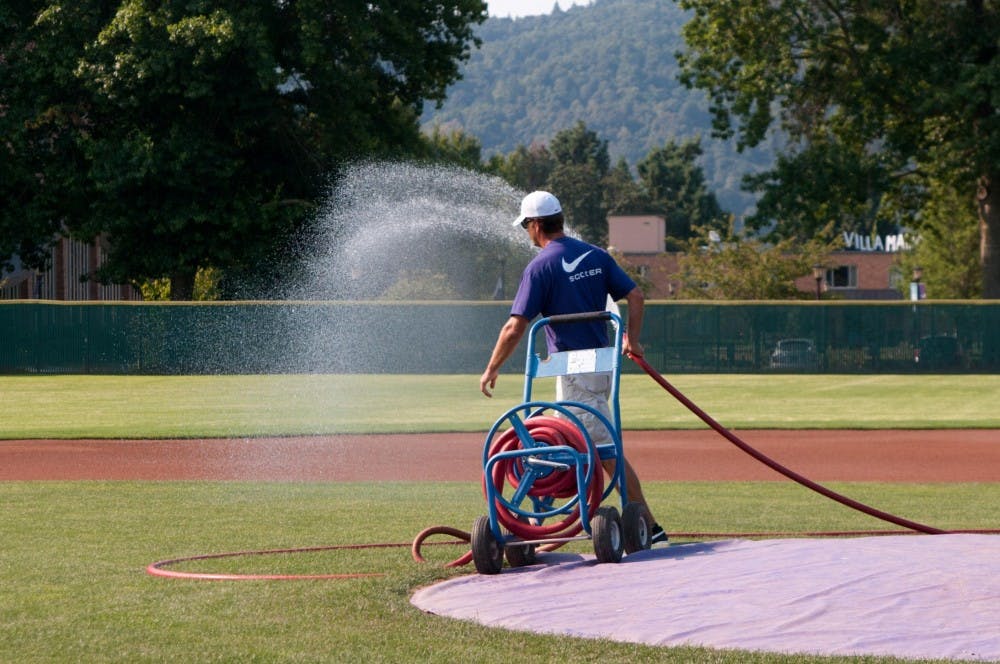16 September 15, 2011
By Jason Hortsch Staff Writer hortsch12@up.edu
With one small bounce of the ball or one slip of a cleat, the entire complexion of a soccer or baseball game can instantly change. The fields used for sports greatly matter, and the athletics department at UP fully recognizes this fact. In July they hired Jay Warnick, whose resume includes stints wtih the Baltimore Ravens and Seattle Seahawks, as Athletics Turf Manager.
UP women's soccer head coach Garrett Smith has already noticed a difference in the quality of field maintenance with Warnick around and has high praise for the new turf manager.
"A blind man would see the difference," Garrett said. "He's meticulous."
Head baseball coach Chris Sperry has also noticed the difference and knows the best is yet to come.
"I have noticed an improvement." Sperry said. "In springtime we will enjoy the full benefits of Jay's work, though."
In addition to appreciating the improvements Warnick has been making, both coaches noted the importance of the playing surface on their respective games.
"When you have a well-maintained field, you don't have to worry about consistency," Smith said.
"You want consistency of surface," Sperry said. "With safety especially in mind, if transitions between grass and dirt are not smooth, that's a sprained ankle for someone."
Warnick could not agree more about the priority of safety.
"We always start with safety, safety for all the participants," Warnick said. "We want it to be a safe, fun experience for everybody. From there, I move to playability. I want to make sure an athlete can do what they practiced and their ability allows them to do. I don't want my fields to hinder an athlete's ability to play."
Warnick earned a B.S. in Ornamental Horticulture at Utah State, but is always willing to try new and creative methods in keeping up his fields. This year, in order to combat a crow problem, he has placed two plastic coyotes in the baseball field to scare the birds away.
"People see the coyotes and don't know they're not real," Warnick said. "They stay back until they realize what's going on."
Even though he has worked in the upper level of professional sports, Warnick always approaches his duties the same way no matter where he is.
"Although it is the NFL, the same principles apply there as here," Warnick said. "I'm trying to put the best field out there for the athletes. When it comes to fundamentals, it's really the same."
Maintaining two different types of fields for two drastically different sports is no easy task, and Sperry acknowledges the obstacles Warnick faces.
"One of his challenges is he's dealing with two radically different playing surfaces," Sperry said. "He's got a plan for making them both as good as they can be."
While to the untrained eye field maintenance may seem the same no matter what the sport, Warnick can easily outline the differences between the two.
"In my eyes, the ball in soccer is in contact with the grass almost all the time," Warnick said. "The speed of the ball is important, so it's important to have a surface that's true. In baseball, all but three players stand on the dirt. The ball also rolls primarily on the dirt."
Finally, while safety and playability are Warnick's two primary responsibilities, all parties agree that aesthetics factor into a turf manager's job as well.
"Looking nice is important from a pride and recruiting standpoint," Sperry said.
Smith was also pleased with Warnick's success in maintaining Merlo Field's image as one of the country's premiere college soccer facilities.
"It looks the part," Smith said.
"As people watch sporting events it's very important the fields look great and represent the University," Warnick said. "I believe that I have a small role in helping the coaches here bring in athletes in the recruiting process."
Despite all of the raving about his work and all of the visible evidence of his success, Warnick is quick to deflect the praise.
"It's not just me. A lot of hard work has gone into these fields," Warnick said. "The coaches are all tremendous and the players help me out. They take pride in their fields. I love it here. Absolutely. Everyone I have met has been very welcoming and extremely kind."
The feeling is certainly reciprocated by the coaches and athletes themselves, who have to look no further than their own fields to see the difference Warnick has made.









